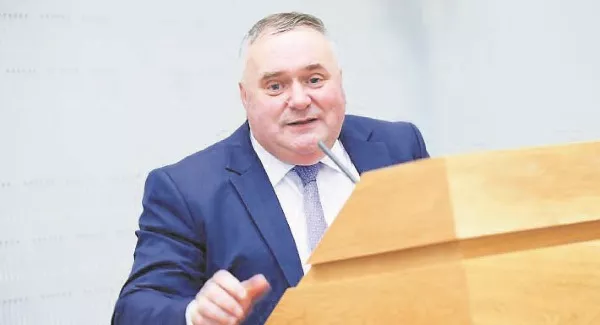By Elaine Loughlin and Juno McEnroe
The Taoiseach is “very confident” that the roll-out of rural broadband will not be delayed despite SSE’s decision to pull out of the project.
The Government’s plan to provide high-speed broadband has been dogged by delays with the latest setback leading Opposition parties to claim the entire project faces collapse.
The decision of utility giant SSE to back out of the plan leaves Enet as the only remaining bidder in the process.
Questions had already been raised around the viability of the National Broadband Plan when both Eir and an ESB-Vodafone joint venture Siro decided not to continue in the tender process.
Amid calls to convene an emergency Cabinet meeting over the issue, Leo Varadkar yesterday said he had received a briefing from Communications Minister Denis Naughten and was confident the National Broadband Plan is still on track.
“He tells me he and his officials are very confident that while the composition of the consortium is changed, it doesn’t affect the project itself,” said Mr Varadkar. “And he still expects that by September we will be able to announce a preferred bidder. So when it comes to broadband, bear in mind that when this Government of Fine Gael and Independents came to office, only about 50% of premises in the country had access to highspeed broadband.
"That’s already up around 75%, it will be 80% by the end of this year. And we remain confident that we will be able to sign with a preferred bidder."
The long-delayed scheme aims to bring high-speed internet to more than 500,000 of the most remote homes, schools, and businesses across the country and would involve the laying of more than 110,000km of fibre-optic cable.
However, Fianna Fáil TD Eugene Murphy criticised the Government saying rural communities no longer believe that the plan will progress.

Eugene Murphy
“We have had nothing but delay after delay with hundreds of thousands of homes and businesses still waiting to be connected to the network,” said the Roscommon/Galway TD. “The withdrawal of SSE from the tender process comes as no surprise but is a huge blow for rural Ireland.”
Mr Murphy said access to quality broadband for rural Ireland is not a luxury but a necessity.
[quote]Farmers cannot complete online applications for payments, schools are unable to access educational aids, and businesses are unable to operate fully functional online services,” he said.[/quote]
Sinn Féin rural affairs spokesman Martin Kenny accused the Government of “incompetence” which he said will now result in a major setback for rural development.
“The programme for government promised high-speed broadband would be delivered to every home and business in the country with 85% delivered in two years and 100% within five years,” he said. “Two years later and the Government has not even awarded the contract.”
Fianna Fáil’s communications spokesman Timmy Dooley said the Government is not providing the funds required to properly roll out the service.

TImmy Dooley
“Fine Gael hasn’t provided the hard cash to make the promise and that’s why the ESB and Vodafone under the banner of Siro, and then Eir, and now SSE have withdrawn from the project,” he told RTÉ’s Morning Ireland.
A spokesman for the Department of Communications said the process to select a company to provide a new high-speed network is now in its final stages with a final tender due to be submitted in the coming weeks.
What is the National Broadband Plan?
The National Broadband Plan (NBP) was first published in August 2012 by then communications minister Pat Rabbitte and set out a strategy to connect all homes, schools, and businesses to high-speed broadband.
The NBP promised to deliver minimum speeds of 30Mbps download and 6Mbps upload by 2020.
This would be achieved through a combination of commercial investment by the telecommunications sector and a State intervention in rural and isolated areas where internet providers acting alone could not financially justify rolling out a service.
Who is covered in the plan?
Initially, the Government said about 840,000 homes would be covered under the State-supported scheme.
However, the number of homes and businesses covered under the NBP was cut to 540,000 last year when the Department of Communications signed an agreement with Eir, the country’s largest telecoms group. Eir agreed to complete around 300,000 units by the end of this year, mainly around regional towns and so deemed commercially viable.
Who will roll out the service?
The Government put the job of providing fast-speed broadband out to tender with three bidders, Eir, Siro, and Enet, initially entering the competition for the contract.
However, Eir and Siro, an ESB-Vodafone joint venture, pulled out of the tender process. SSE, which had been part of the Enet consortium, is the most recent player to exit, leaving serious question marks over the entire project.
It is believed that the considerable reduction in the number of homes and businesses covered in the contract had an impact in the decision of bidders to drop out of the tender process, especially since houses left in the plan are generally the most isolated in the country.
Enet had indicated it will continue with its bid despite a major stakeholder in the consortium pulling out.
A Department of Communications spokesman said the procurement process is continuing on schedule with the remaining bidder committing to submit its final tender shortly. When the tender is submitted the department expects to bring the process to a conclusion shortly afterwards.






